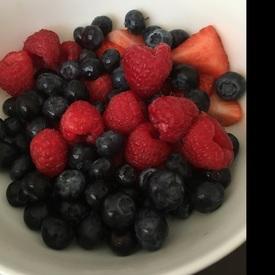Gaining weight from exercising?? HELP!!!!!!

Ducati58
Posts: 20 Member
I am REALLY disappointed!! I don't know if it's winter weather or what but I have bumped my MFP calories up to 1360 to drop one pound a week vs. 1 1/2 pounds a week that I was doing a year ago AND I'm exercising six days a week....Spin classes twice a week, treadmill and weights the other three days of the week and I'm gaining weight every week....does anyone have any ideas on what's going on with my body?? I lost 48 lbs. by last November, plateaued, and then started gaining very slowly ever since I started doing Spin classes and staying inside because of the crappy weather (I usually trail walk and bicycle all summer and fall outside). I eat back most of my calories and try to keep my carbs under 150 grams..... 
0
Replies
-
muscle?0
-
1360 sounds really low if you're doing spin class. I wore my HRM to a spin class this morning and I burned about 600 calories in an hour. It's probably very likely that you need to increase your calorie intake to lose more weight. Also, when I first start working out or a new exercise my body usually holds on to water weight for a week or so. Could that be an issue here? Finally, how do you feel about calorie cycling? I had about 15 lbs of vanity weight to lose so I hit a lot of plateaus and I broke through all of them with calorie cycling. It's basically finding your net calories for the week (for convenience sake lets say 7,000 calories per week) and randomizing how many calories each day but making sure you stay at the 7,000. So it could be 800 one day and 1200 another so on and so forth. Obviously you should be eating a lot more than 7,000 calories a week but that was just math I could do

Hopefully one or all of these suggestions can help.0 -
Have you attempted to recalculate your TDEE and BMR since you've lost the 48lbs? (Congratulations by the way!)
It is said that it's best that you recalculate every time you lose about 10% of body weight as the numbers change from your initial numbers.
From recalculating that, particularly TDEE, you should get a higher number than 1360, probably something closer in the 1600-1800 range depending on your stats. You might gain initially due to water weight but that should level off eventually...Trial and error.
PS. you can't gain muscle on a calorie deficit, nor can you gain real weight ( unless you've messed up your metabolism with low calorie eating).0 -
muscle?
nope. water & glycogen0 -
Could be muscle if you're lifting heavy. But if you're lifting light, chances are it's not muscle. What about your measurments? Size? Any changes? How's your eating?0
-
muscle?
nope. water & glycogen
You can't throw something out there like glycogen and not explain!0 -
Have you been tracking your measurements? I've been stuck at 178-181lbs for a few months BUT I've gone down from a size 18 to a size 14.
If you are using MFP's #s, just be aware that they do expect you to eat your exercise calories back. Did you choose your right activity level? Did you choose a 1lb loss and not a 2lb loss a week? If not, recalculate.
Or, If you want, check out this link by MFPer Heliotsdan - It'll give you a detailed walkthrough (with pictures even) on finding your TDEE and calculating what you should be eating.
http://www.myfitnesspal.com/topics/show/654536-in-place-of-a-road-map-2-0-revised-7-2-12
Or for a different version to figure out your TDEE, as well as some great advice...check out:
http://www.myfitnesspal.com/topics/show/833500-what-do-i-do-common-sense-cliff-notes
http://www.myfitnesspal.com/topics/show/844040-raspberry-ketones-for-the-rest-of-us
Also, if you are worried about the calorie intake, I also suggest you read this thread that has numerous people who met their goals and are maintaining. Some for years and they also provide their calorie intake and how often they work out.
http://www.myfitnesspal.com/topics/show/816542-let-s-hear-it-for-maintainenance
For more information about fitness and nutrition, I highly suggest checking out and joining this group: (Read all the stickies. It's great information to know.)
http://www.myfitnesspal.com/groups/home/10118-eat-train-progress
http://www.myfitnesspal.com/topics/show/865230-resources-and-references
For info about your macros (proteins/fats/carbs) - check out this link. It will give you the formula to figure out your #s and also how to custom change them in MFP:
http://www.myfitnesspal.com/topics/show/819055-setting-your-calorie-and-macro-targets
Yes, this is can all be overwhelming and complicated , but you are more than welcome to ask questions on the post.
One of the things that I have found that has been one of the best methods for me to get fit is to understand fitness. To understand where all these figures, etc come from.
The good thing is once you get the hang of it - it is something you'll be aware of constantly and you'll get a better understanding about your eating habits.
So I HIGHLY suggest making the effort to take every chance to educate yourself. Even if you don't end up going with any of these methods, calculations, etc - at least you understand what they are, where others are coming from, and maybe they will still be able to help you figure out what is best for you.0 -
muscle?
nope. water & glycogen
You can't throw something out there like glycogen and not explain!
In laymen's terms (because i am a laymen), glycogen is your body's energy storage. When you start working out, your body responds by storing more glycogen for the next workout. Also, when you stress those muscles, the body surrounds them with water to pamper them and let them heal up so they can work harder next time. It is extremely common/normal/expected to see a weight gain on the scale when starting an exercise program, or even changing up to a a program you're not used to. Bottom line is that this is a good thing. It's not FAT gain. And it's a reason why the scale is a crude measurement of progress.
These are all better forms of progress measure:
How are your clothes fitting?
How do you look in the mirror?
How do you FEEL?
How much more can you lift?
How much longer and harder can you exercise?
How much faster can you run?0 -
My nutritionist told me a year ago to keep my carbs to 150 grams or less a day....that took off most of the weight....now I think maybe I should have even less ??0
-
I've stopped weighing myself for this very reason. And I'm much happier. I lost steadily and was actually happy with my weight up until January. I've been doing strength training (Chalean Extreme) and cardio (Turbo Fire). The scale number has remained the same and on some days has been higher. But my body has shrunk and I am physically leaner and more defined. My clothes are too loose. So honestly, what matters more? A silly number on the scale or how we look and feel and the progress we make? I think we all know the answer. The scale is psychological. It messes with our minds. So unless you see something drastically wrong with the way you're looking/feeling and need to see if there's something going on, I say ditch the scale and keep going. But I do agree that you should look ate your TDEE (I used Dan's Roadmap from this community) to see your specific calorie requirements to see if you're eating enough for what you're doing now based on your body fat, etc.0
-
interesting, thanks for sharingmuscle?
nope. water & glycogen
You can't throw something out there like glycogen and not explain!
In laymen's terms (because i am a laymen), glycogen is your body's energy storage. When you start working out, your body responds by storing more glycogen for the next workout. Also, when you stress those muscles, the body surrounds them with water to pamper them and let them heal up so they can work harder next time. It is extremely common/normal/expected to see a weight gain on the scale when starting an exercise program, or even changing up to a a program you're not used to. Bottom line is that this is a good thing. It's not FAT gain. And it's a reason why the scale is a crude measurement of progress.
These are all better forms of progress measure:
How are your clothes fitting?
How do you look in the mirror?
How do you FEEL?
How much more can you lift?
How much longer and harder can you exercise?
How much faster can you run?0 -
muscle?
nope. water & glycogen
You can't throw something out there like glycogen and not explain!
In laymen's terms (because i am a laymen), glycogen is your body's energy storage. When you start working out, your body responds by storing more glycogen for the next workout. Also, when you stress those muscles, the body surrounds them with water to pamper them and let them heal up so they can work harder next time. It is extremely common/normal/expected to see a weight gain on the scale when starting an exercise program, or even changing up to a a program you're not used to. Bottom line is that this is a good thing. It's not FAT gain. And it's a reason why the scale is a crude measurement of progress.
These are all better forms of progress measure:
How are your clothes fitting?
How do you look in the mirror?
How do you FEEL?
How much more can you lift?
How much longer and harder can you exercise?
How much faster can you run?
This^^^0 -
Bump0
This discussion has been closed.
Categories
- All Categories
- 1.4M Health, Wellness and Goals
- 398.2K Introduce Yourself
- 44.7K Getting Started
- 261K Health and Weight Loss
- 176.4K Food and Nutrition
- 47.7K Recipes
- 233K Fitness and Exercise
- 463 Sleep, Mindfulness and Overall Wellness
- 6.5K Goal: Maintaining Weight
- 8.7K Goal: Gaining Weight and Body Building
- 153.5K Motivation and Support
- 8.4K Challenges
- 1.4K Debate Club
- 96.5K Chit-Chat
- 2.6K Fun and Games
- 4.8K MyFitnessPal Information
- 13 News and Announcements
- 21 MyFitnessPal Academy
- 1.6K Feature Suggestions and Ideas
- 3.2K MyFitnessPal Tech Support Questions









